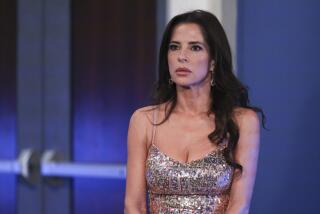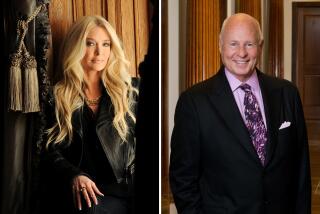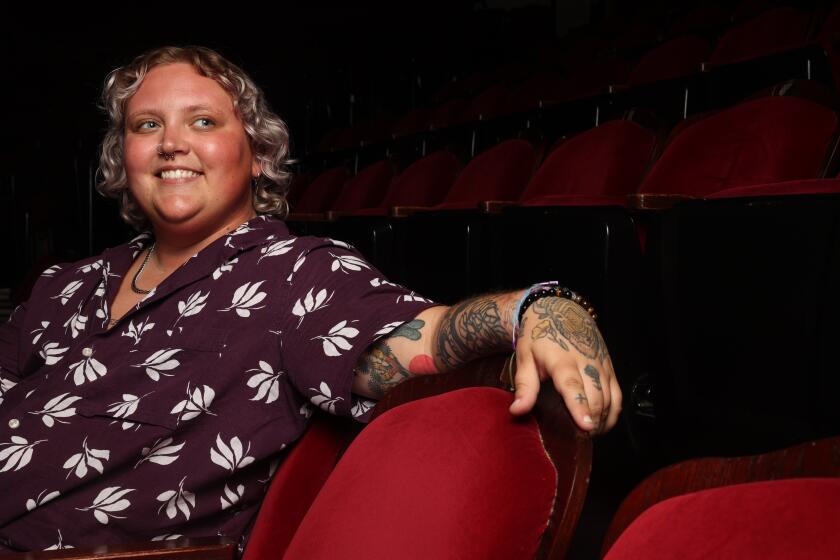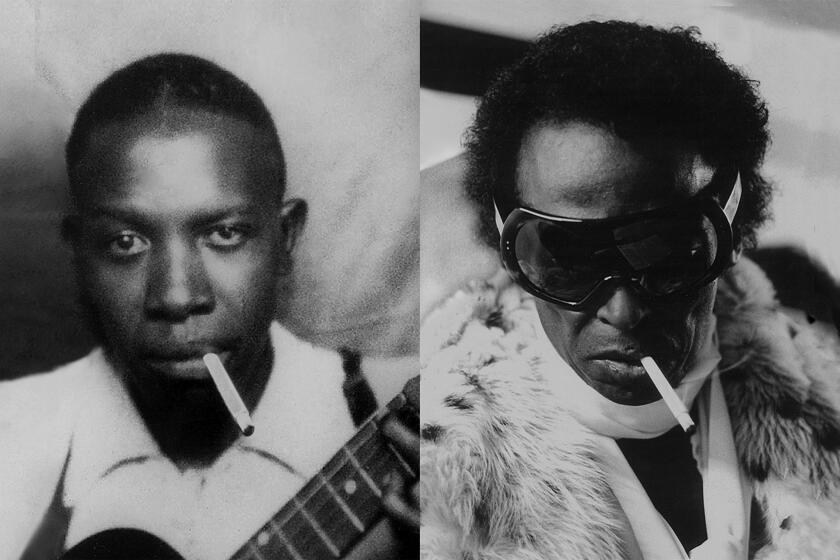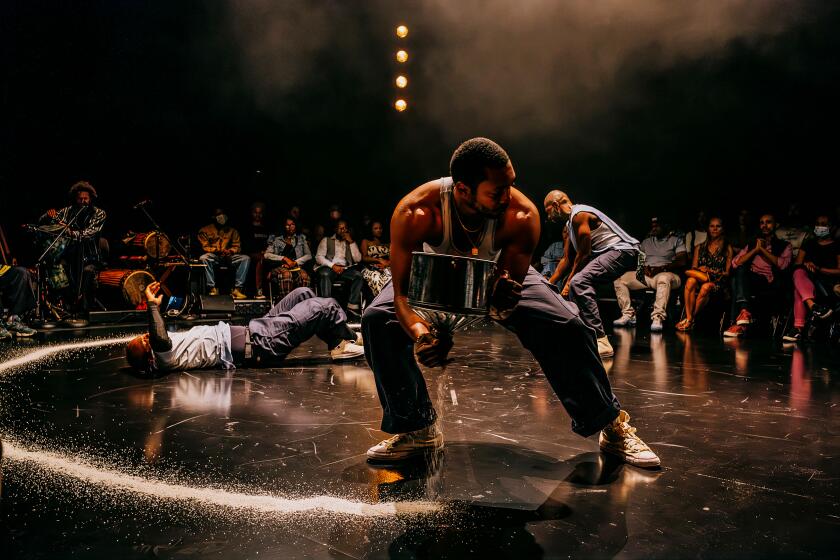Laying Down His Own Law
Paris Barclay lights a Kool cigarette and sits down at the piano in his Hancock Park home. It hasn’t taken much coaxing to get Barclay to play the two songs he’s written for a planned Broadway musical version of Alice Walker’s novel “The Color Purple,” a show for which he’s vying to do the music. It’s a weekday midmorning, the sun drenching the spacious living room in his circa-1920s home. For Barclay, this is a stolen, peaceful moment; there’s a beeper affixed to his belt that at any moment might summon him from his cocoon to his other world, the relative universe of Steven Bochco Productions and “NYPD Blue.”
Back when he thought it his destiny to write musicals for a living, Barclay put together a show called “On Hold With Music,” based on his experiences in the advertising game. At the time, Barclay was in the ASCAP Musical Theater Workshop in New York, studying with Stephen Sondheim and Charles Strouse. Sondheim called Barclay’s show “terrible but not untalented” and, as Barclay remembers it, the composer advised him to shift his focus to musicals about “the black experience.”
“Unfortunately,” Sondheim said, “you’re writing musicals with white people, which means you’re competing with me and everybody else who’s white.”
Cut to some 20 years later. Against Sondheim’s advice, Barclay is still working with so-called “white” material--it’s the reason people say, “Oh, really?” when you tell them that the guy who won an Emmy last year for directing ABC’s “NYPD Blue” is black. You get another “Oh, really?,” the eyebrows arching a little higher, when you tell people he’s gay, too. It’s a worrisome issue to Barclay but only to a point; his pride of identity has its pragmatic side. He seems intuitively to understand that you get furthest in life not beating any drums.
Now 42, Barclay is gradually shedding the role of anomaly, of token, of overachiever--of whatever well-meaning part anyone else has put on him.
“Every time you mention [that] a director is black it gets a little boring and frankly in the way,” says Thomas Carter, an Emmy-winning television director and producer (HBO’s “Don King: Only in America”) who has had to outrun some of the same stigmas.
For Barclay, as for Carter, the work, finally, is speaking louder than those voices. Next year Barclay becomes a co-executive producer on one of the most lauded police dramas of all time. But more significant are the “side projects” on Barclay’s menu. He may direct a miniseries in development at HBO based on David Halberstam’s book “The Children,” about the early years of the civil rights movement. And then there is the possibility of “The Color Purple.” That’s not to say Barclay couldn’t do all these things and fall flat on his face. But he appears to have the versatility of talent, not to mention the confidence, to pull them off.
Barclay says his ultimate goal is television show creator power. Not black show creator, not gay show creator power. Just show creator power. He’d like, he says, to have an Ed Zwick-type career, referring to the writer-director-producer who segues back and forth between movies (“Courage Under Fire”) and television (“thirtysomething”). And if Barclay is one of only a handful of black directors in television, you practically fall off a cliff looking for black “Ed Zwick types.”
“There are no black people who are in a position to really run a show of influence in the country,” Barclay says. “OK, maybe Oprah Winfrey.”
And so, until his day comes, Barclay gives to Democratic causes (there’s a framed picture of the Gores in his office, a framed photo of President Clinton in his Hancock Park home), serves on Directors Guild of America boards and committees, and last year won Project Angel Food’s Founders Award for his work with the L.A. organization that delivers meals to people facing AIDS. And while he speaks his mind on race and sexual orientation, he isn’t about to pull a DeGeneres / Heche--you know, decry the hypocrisy toward homosexuality in Hollywood, then repair to a villa in Ojai, waiting for the entertainment community to catch up to him.
Besides, Barclay has known how to succeed as an outsider since leaving his Harvey, Ill., neighborhood at the age of 14 to attend the exclusive all-white prep school La Lumiere in La Porte, Ind. More fish-out-of-water experiences followed: at Harvard, where he majored in English, wrote musicals and roomed for three years with Arthur Golden, best-selling author of “Memoirs of a Geisha”; in New York, where Barclay was a self-described “token to be shown off at meetings” in the white world of New York advertising; and finally as supervising producer and director at “NYPD Blue,” where he has been behind the camera for some of the series’ most go-for-broke episodes, including this season’s farewell to Det. Bobby Simone, played by Jimmy Smits.
Says Smits, who spent the entire episode in a hospital bed, dying: “I’m so thankful it was [Barclay] directing, because he helped me take the leap in terms of challenging myself. I thought, ‘I’m just going to be in this [expletive] bed.’ So we were always trying to find new spins on things, to make the audience go through the grieving thing but trying not to be sentimental.”
Last season, Barclay won the Emmy for directing the 90-minute “Lost Israel, Part Two” episode, in which a father eventually confesses to molesting and killing his young son, a murder he first tries to pin on a mute transient. Because “NYPD Blue” so often goes for the emotional jugular, watching the show can feel like an exercise in voyeurism. But Barclay prides himself on understanding the scenes intuitively, and knowing when artifice is overshadowing realism.
“I watch everything, and I have all these tendrils, and I just feel a lot,” he says. “That’s why actors like me, because I really pay attention to them.”
Behind the scenes, once again, Barclay makes an interesting sociological fit. He finds himself among a group that includes the son of TV royalty (executive producer and director Mark Tinker, son of Grant Tinker), a show creator ubermensch (Steven Bochco), a former New York detective (co-executive producer Bill Clark) and the show’s executive producer, head writer and creative soul and psyche, David Milch.
Barclay is “fifth in command,” which means he directs five episodes a year and as supervising producer has to worry about virtually every production aspect of the show, from casting to costumes to whether new series regular Rick Schroder should have his chest shaved for sex scenes.
Worrying, it turns out, is something Barclay is very good at.
“Paris gets to it kind of kicking and screaming, in a very endearing way,” says Milch. “He gets sick before he goes to work. I always walk in and I see him hunched at his desk. It’s a curious kind of unconscious psychological strategy. Paris makes himself small as a way of making himself leap.”
Tinker recalls how Barclay’s persistent fretting prompted staffers to rename one episode “Is Paris Burning?”
“He’ll wander into my office at least three times a day and I’ll say, ‘OK, what have you unearthed now?”’ says Tinker, who won a directing Emmy of his own last year, tying Barclay, for Bochco’s since-canceled “Brooklyn South.”
*
Barclay gets the occasional jab about his sexual orientation, but evidently in a way that makes him feel like one of the family. If the upper echelon at “NYPD Blue” amounts to a boy’s club, it’s not one that excludes gay men.
“It’s interesting how everyone who has had a meteoric rise there has had one thing in common--they’re male,” says a former staffer.
“They make fun of everyone here,” Barclay says. “Bill Clark’s weight. Mark Tinker’s [lack of] hair.”
Milch, Tinker and Bochco fire back. Barclay’s a clotheshorse, and sometimes they can’t fathom his attire.
“He has horrendous taste in clothes,” Bochco says. “The worst shoes I’ve seen.”
“Purple shoes,” Milch adds. “He wears some purple shoes.”
All of this good-natured ribbing is in sharp contrast to the experience Barclay says he had as director of the 1995 feature “Don’t Be a Menace to South Central While Drinking Your Juice in the Hood,” the forgettable “Boyz N the Hood” parody starring the Wayans family. Barclay wanted to walk off the project; ultimately, the homophobia he endured on the film convinced him not to hide his sexuality professionally anymore. (A source for the Wayans, while not denying there were problems on the set, said the conflicts had nothing to do with Barclay’s being gay.)
“I realized I empowered people to make it an issue by not being open about it,” Barclay says. “So I said, ‘From now on I’m not going to do this. If I’m open about it, it can never be an issue. The people who are homophobic or feel that’s important to know, [they] will not ask me for jobs.”
Of course, were he an actor, Barclay acknowledges, the decision would have been much tougher.
“I’m trying to encourage more of the actors that I know and more of the behind-the-scenes people that I know to be open about it and not be so cagey,” he says.
Barclay will have to be a bit cagey himself as his profile grows. It’s the Sondheim factor all over again. Add gay to the mix and you just increase the preconceived notions. “NYPD Blue” takes up 14 hours of his working day, but there are hiatuses to think about. He’s had conversations about directing Glenn Close in a film version of “South Pacific,” about HBO’s “The Children” and (the job that really lights up his eyes) about doing the music for “The Color Purple.”
Meanwhile, Barclay will try to stay one step ahead of the stereotypes.
“I’d seen Paris’ work in ‘NYPD Blue’ and liked the work. I didn’t know he was black,” says Carter. “I was blown away by [the quality]. This was extraordinary work for television, both in terms of the performances he got from the actors and the way he translated the story visually.”
John Wells, executive producer of the NBC mega-hit “ER,” gave Barclay his first job in prime-time television, hiring the fledgling director for his short-lived 1992 series “Angel Street.” Wells then hired Barclay again to direct on “ER,” which got him noticed at “NYPD Blue.”
“You look at Carl Franklin directing ‘One True Thing’ this year,” Wells says. “That couldn’t be a more upper-middle-class white experience. We are slowly moving away from these kinds of restrictions. But all of us have to fight them. We did not hire Paris because he was a good black director. We hired him because he’s a good director. Your liberalism at some point gets left at the door and you’re just trying to find someone who can do the job.”
*
Meeting a reporter in his office at Bochco Productions on the 20th Century Fox lot, Barclay seems pleasantly harried. It’s Friday, around lunchtime, and Barclay is on the phone, arranging dinner tonight with actor Kevin Spacey, whom he’s hoping to direct in a film adaptation of Larry Kramer’s much-traveled 1985 AIDS play “The Normal Heart,” to be co-produced by actor Anthony Edwards’ Aviator Films. “It’s kind of exciting,” Barclay says of having dinner with Spacey. But a few days later he reports that it wasn’t that exciting after all--a perfunctory sit-down with too many people at Jerry’s Deli in Westwood.
In another life, Barclay says, the life where he grows up independently wealthy and can do what he wants, he writes a string of hit Broadway musicals. But “Stephen Sondheim is Stephen Sondheim because he’s never had to work a day in his life,” he notes over lunch in the Fox commissary, where a giant poster of the upcoming “Star Wars” prequel looms over the tables. “He never had to have a job; his family was always wealthy.”
Barclay was born in working-class Chicago Heights, one of seven children. His father was the foreman at a tile plant and his mother a social worker. Barclay carried a chip on his shoulder as an adolescent, but he was also a good student and football player, and so when the all-white La Lumiere School decided to diversify its ranks ever so gently, Barclay became an attractive candidate for a scholarship. He didn’t want to go, and only agreed to it if the school would admit his 15-year-old brother, Neil, which they did. It was the mid-1970s, and they were two of only three black students at the school.
“No one ever called me the N-word,” Barclay says. “They were a little too sophisticated for that.” Still, he felt subtly excluded, thrust suddenly alongside the offspring of wealthy families like the Comiskeys of Chicago.
“The first six months of the time I was there I was completely overwhelmed and felt totally less than,” he says. “I felt I was not as good as these kids with their big families and big houses. It may have been responsible for my excessive overachieving. The best I could do was study my ass off and work at football.”
By the time he was 16, school officials were pushing him to apply to Harvard. Without discounting his own qualifications, Barclay says he knew he was being used as a kind of political football, that La Lumiere had good intentions but they also wanted to be able to say they had sent one of their black students to Harvard.
Today, there’s a Barclay Family Scholarship at La Lumiere, which sends one student a year to the school (not necessarily based on race, Barclay says, but on talent in athletics or the arts), and Barclay gives money as well to the Office for the Arts at Harvard. He puts his money there because Harvard doesn’t have a theater major, and Barclay knows something about being a would-be thespian hoping to get the school to fund a show.
Though putatively an English major, Barclay spent much of his time at Harvard writing musicals--16 in all, he says. Twice, he beat out other students to write the music for the school’s annual Hasty Pudding Theater review shows. As a freshman he met Golden, the future author of “Memoirs of a Geisha”; together, the two wrote a musical called “Niccolo and the Prince,” in which a dead Machiavelli takes an earthly prince on a guided tour through history. The two have remained friends. Barclay wrote an original song for Golden when he got married and again when his daughter was born.
“It is a funny journey he’s taken,” Golden says, ruminating on Barclay’s progression from composer-in-waiting to director of a prime-time cop show. “I would have been absolutely certain that Paris would be writing musicals [today].”
Barclay was certain, too, which is why after graduating from Harvard he moved to New York. To make money, he worked as an advertising copywriter at a succession of prestige firms, once again knowing he was talented but that he was also convenient politically.
“I was in demand, just for diversity, just so they could show me at the meetings. I was a big token at that time. I moved to a lot of different agencies, always upping my salary by using that token status.”
In the meantime, Barclay won a spot in the American Society of Composers, Authors and Publishers’ Musical Theater workshop, where he worked with Sondheim and was told to do “black” musicals. Barclay thought the comment incredibly racist, but he took it to heart anyway and adapted a short story by Richard Wright called “Almost a Man,” a show that was eventually produced off-Broadway. In the decade that followed, he also began to direct commercials and music videos, working for, among others, Harry Connick Jr., Barry White, Luther Vandross and Bob Dylan.
“What happens a lot when you see [music] videos, they’re flashy but they’re not trying to tell a story,” says Wells, who hired Barclay for “Angel Street” based on his music video reel. “He was telling a story in a fluid way, where the camera was very controlled and inventive.”
*
During his narrative over lunch, Barclay is somewhere between La Lumiere and “NYPD Blue” when Milch stops briefly at the table.
“I’m telling him I’m the Negro version of you,” Barclay says.
“I don’t know what that means,” Milch shoots back.
More than anyone, Barclay points to Milch as his kindred spirit on “NYPD Blue.” This is something of an irony considering Milch provoked a brief furor in 1994 with his “I’m racist” comment at a writer’s workshop, clarifying later that he meant to say he mines a racist creative voice in fleshing out the Det. Sipowicz character, played by Dennis Franz.
On the subject of Milch, Barclay fairly radiates, arriving repeatedly at the word “genius.” Given Milch’s messianic approach to his work (and his reputation as a compulsive revisionist), it seems crucial that someone in Barclay’s position regard him as a genius. After Milch breezes past the table, Barclay elaborates on their relationship, saying in only a half-joking way: “You know, we’ve got that Ivy League bonding thing going on. He was at Yale doing heroin; I’m at Harvard drinking vodka. It’s the same story, different location.”
More specifically, both live with shadow, addicted selves. Like Milch, Barclay battled a decade-long dependence on alcohol and drugs, and continues to deal with a personality wired for escape into self-destruction. By way of example, Barclay recalls directing an episode last season when he slowly began to act out his anxiety.
“I didn’t know what I was doing. I was mean, I was being sarcastic. I was shooting a scene where a woman was recounting her rape and that was upsetting me, because I have a whole thing about violence, and, in particular, violence against women. . . . It makes me really get mad in a way that certain other violent acts don’t. So I’m doing this scene that’s very, very painful for me. And I’m complaining about everyone.”
Eventually, Barclay found himself sitting at his monitor on the set, crying. By the end of the day, things had degenerated to the point that Milch decided to pull him aside.
“David takes me outside and he says, ‘You know what, I’ve been watching you, and I think you’re getting ready to drink. . . . The way you’re acting, that sort of misbehavior, it’s like I am just before I get ready to get really drunk. I wish you wouldn’t do that.’ ”
Later, in an interview, Milch listens to a recounting of the episode and says of his relationship with Barclay: “It isn’t that we’re addicts so much as we’re trying to be healthy, and that entails acknowledging and sharing our experiences. What they say in AA is, ‘Our secrets make us drink.’ I admire Paris enormously, because he tries as an artist to work without secrets.”
If Milch talks about the characters of “NYPD Blue” with the slightly detached air of an author psychoanalyzing his characters, Barclay speaks of them as though they were immediate family.
“NYPD Blue,” he says, is “really this family drama that’s set in this police precinct. That’s why we usually catch the perp every week. Because that facilitates the real theme of the show, which is [that] those of us who love each other end up caring about each other in very deep and long-standing ways.”
This seems like an awfully saccharine way to describe a show that can be just as much about bullets and testosterone (and yes, catching the perp). But then you think about how often “NYPD Blue” involves characters pushed to the point of no emotional return, and you realize that an empath like Barclay is probably a valuable guy to have around.
“You just calculate how the performance is best suited,” he says. “I know that Kim [Delaney] is going to go soon, because all of her emotions are right on the surface, so I gotta do her close-ups fast. Shortly after the rehearsal, she’s as emotional as she’s going to be, and the longer you keep doing it, the harder it’s going to be for her to maintain that emotion.”
Still, in television, a medium of faces and words, directors don’t get much glory. This makes Barclay’s artistic contribution to “NYPD Blue” a bit hard to gauge. In addition, Barclay arrived on “NYPD Blue” at the beginning of its fifth season, on a show whose visual look and tone were so established they were being imitated.
“A good director in television is a guy who can give the producer of the program a show that the audience will recognize as an episode of that show,” says Tinker. “Very few producers are looking to reinvent the wheel with an episode. If somebody can come to a TV show from the outside and understand the essence of the show and characters, that’s the guy you want working with you.”
Barclay concedes it’s his job to realize someone else’s vision.
“I think I’m very fortunate to be a student here, at this point,” is how he puts it. “That’s really my point of view. . . . I’m in the land of the giants figuring out what’s going on.”
And figuring out how to work the system.
“I do think because of my experience living in both worlds, living in an African American household, and also being educated in the white world of Harvard and New York, it gives me a perspective to tell different kinds of stories than are currently being told.”
*
You could easily fashion Barclay’s own life story into a drama--maybe spin off the La Lumiere prep school years into something for the WB. Or take Barclay’s musical background, combine it with his experience on a police drama--oh, wait, that was “Cop Rock.”
“You haven’t asked me about my personal life,” Barclay says finally, after days under persistent questioning about where he came from and how he got here.
He is sitting outside on the patio at home, by his pool, dragging on a Kool, allowing himself one more cigarette before he heads back to work. He recently ended an eight-year relationship, he volunteers, and doesn’t have much time for a social life. “What I decided to do at the beginning of ‘NYPD Blue’ was focus on that,” he says. “Rather than chasing after boys.”
Inside the house, the phone rings--or is it the fax machine? Someone back at headquarters needs something, no doubt, but it’s peaceful out here, quiet, and for this moment, anyway, Paris is not burning.
More to Read
The biggest entertainment stories
Get our big stories about Hollywood, film, television, music, arts, culture and more right in your inbox as soon as they publish.
You may occasionally receive promotional content from the Los Angeles Times.

